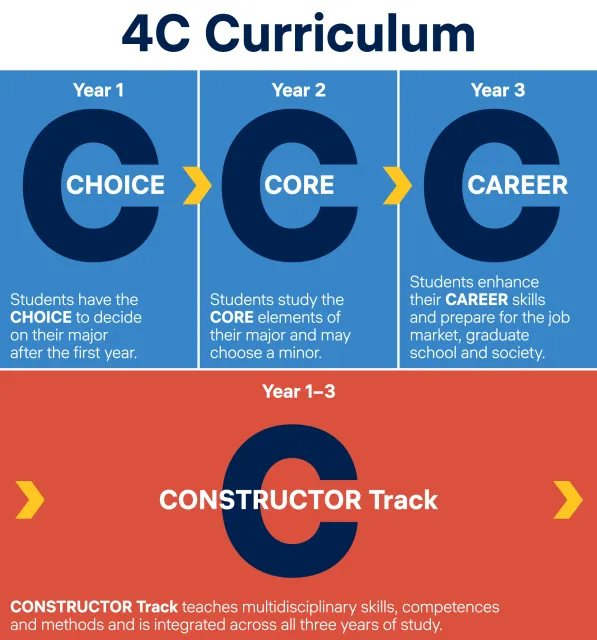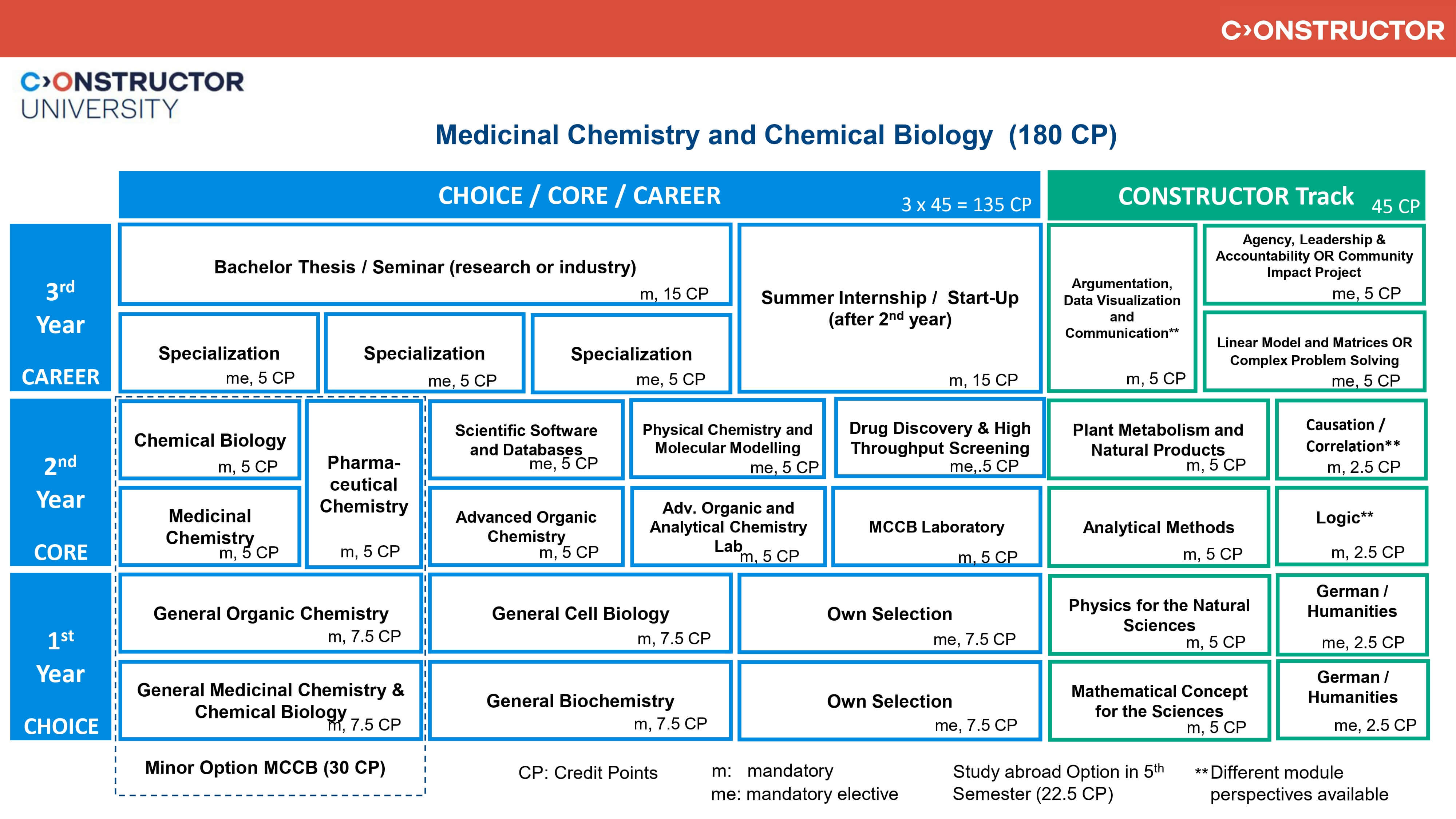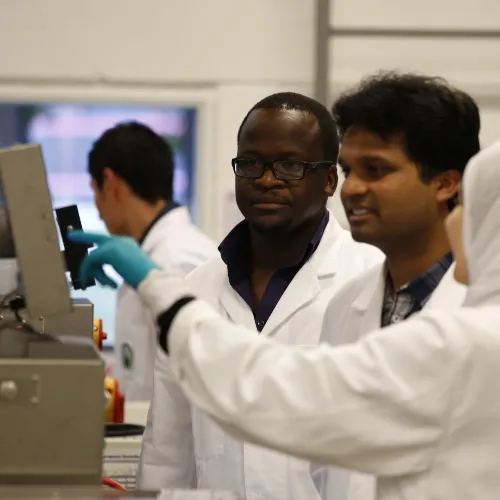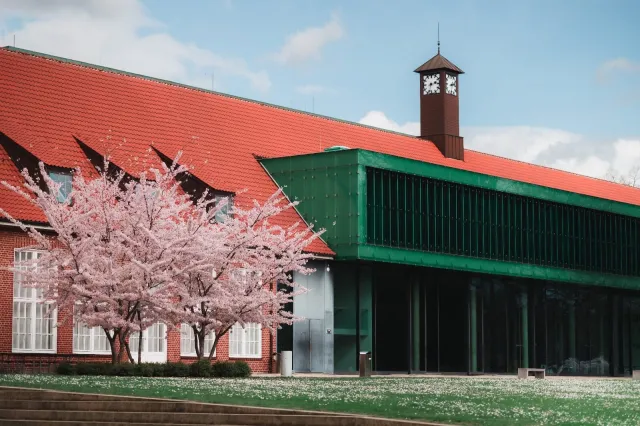

Medicinal Chemistry and Chemical Biology
Medicinal Chemistry and Chemical BiologyThis study program belongs to the School of Science
Location: On Campus
The global pharmaceutical industry requires well-trained scientists who have the education and ambition to drive innovative drug development. The English-taught Medicinal Chemistry and Chemical Biology (MCCB) program places the student at the forefront of those efforts by providing a fundamental understanding of the drug-body interaction from the molecular to the physiological level. By engaging this broader approach, that is, not only trying to cure disease (medicinal chemistry) but also placing an emphasis on the underlying associated cellular pathways (chemical biology), further innovative opportunities for treating disease will come forward. In this regard the MCCB program is unique within the German academic landscape and should help bridge the evolving needs of the high growth pharmaceutical industry.
The undergraduate program at Constructor University is a three-year, 180-credit-point program designed to prepare students for a wide range of career paths.
The “4C Model” is the program's backbone, with disciplinary content grouped into three themes according to study years: CHOICE-CORE-CAREER. Additionally, the “CONSTRUCTOR Track”, an integral part of the program, runs parallel throughout the program. It provides students with multidisciplinary content and essential skills such as argumentation, data visualization, societal engagement, and communication.
The curriculum allows students to tailor their education to their goals and to explore different fields of study, with the flexibility to change their major within the first year. Moreover, the programs include a mandatory internship and a study-abroad opportunity in the fifth semester to provide students with hands-on experience and a global perspective.

The first study year is characterized by a university-specific offering of disciplinary education that builds on and expands upon the students’ entrance qualifications. Students select introductory modules for a total of 45 CP from the CHOICE area of a variety of study programs, of which 15-45 CP will belong to their intended major.
To pursue an MCCB major, the following CHOICE modules (30 CP) need to be taken as mandatory modules (m) during the first year of study:
- CHOICE Module: General Medicinal Chemistry and Chemical Biology (7.5 CP)
- CHOICE Module: General Biochemistry (7.5 CP)
- CHOICE Module: General Organic Chemistry (7.5 CP)
- CHOICE Module: General Cell Biology (7.5 CP)
In their second year, students take a total of 45 CP from a selection of in-depth, discipline-specific CORE modules. These modules aim to expand students’ critical understanding of the key theories, principles, and methods in their major for the current state of knowledge and best practice.
To pursue the MCCB as a major, the following mandatory CORE modules (30 CP) must be taken:
- CORE Module: Medicinal Chemistry (m, 5 CP)
- CORE Module: Chemical Biology (m, 5 CP)
- CORE Module: Advanced Organic Chemistry (m, 5 CP)
- CORE Module: Pharmaceutical Chemistry (m, 5 CP)
- CORE Module: Advanced Organic and Analytical Chemistry Laboratory (m, 5 CP)
- CORE Module: Medicinal Chemistry and Chemical Biology Laboratory (m, 5 CP)
Students can decide to either complement their studies by taking the following mandatory elective (me) CORE modules (15 CP) within MCCB:
- CORE Module: Scientific Software and Databases (5 CP)
- CORE Module: Drug Discovery & High Throughput Screening (5 CP)
- CORE Module: Physical Chemistry and Molecular Modelling (5 CP)
or they may substitute these modules with CORE modules from a second field of study according to interest and/or with the aim to pursue a minor.
During their third year, students prepare and make decisions for their career after graduation. To explore available choices fitting individual interests, and to gain professional experience, students take a mandatory summer internship.
The 5th semester opens also a mobility window for ample study abroad options. Finally, the 6th semester is dedicated to fostering the research experience of students by involving them in an extended Bachelor thesis project.
To pursue MCCB as a major, at least 10 of the 15 CP from the following major-specific Specialization Modules need to be taken:
- MCCB Specialization: Natural Products & Antibiotic Drug Discovery (me, 5 CP)
- MCCB Specialization: Advanced Organic Synthesis (me, 5 CP)
- MCCB Specialization: Synthetic Biology (me, 5 CP)
A maximum of 5 CP can be taken from major-related modules instead of major-specific Specialization Modules:
- BCCB Specialization: Current Topics in the Molecular Life Sciences (me, 5 CP)
- BCCB Specialization: Biomedicine (me, 5 CP)
- BCCB CORE: Advanced Biochemistry I (me, 5 CP)
- BCCB CORE: Advanced Biochemistry II (me, 5 CP)
- BCCB CORE: Infection and Immunity (me, 7.5 CP)
- CBT CORE: Physical Chemistry (me, 5 CP)
- Specialization (CBT): Organometallic Chemistry (me, 5 CP)
- Specialization (CBT): Biotechnology in Action (me, 5 CP)
Students may also select 15 CP entirely from their major-specific Specialization Modules.
As a core element of Constructor University’s employability approach students are required to engage in a mandatory two-month internship of 15 CP that will usually be completed during the summer between the second and third year of study. This gives students the opportunity to gain first-hand practical experience in a professional environment, apply their knowledge and understanding to a professional context, reflect on the relevance of their major in employment and society, reflect on their own role in employment and society, and find professional orientation. As an alternative to the full-time internship, students interested in setting up their own company can apply for a start-up option to focus on the development of their business plan.
The CONSTRUCTOR Track is another important feature of Constructor University’s educational model. The Constructor Track runs orthogonal to the disciplinary CHOICE, CORE, and CAREER modules across all study years and is an integral part of all undergraduate study programs. It provides an intellectual tool kit for lifelong learning and encourages the use of diverse methodologies to approach cross-disciplinary problems. The CONSTRUCTOR track contains Methods, New Skills and German Language and Humanities modules.
Methods
Methods and skills such as mathematics, statistics, programming, data handling, presentation skills, academic writing, and scientific and experimental skills are offered to all students as part of the Methods area in their curriculum. The modules that are specifically assigned to each study programs equip students with transferable academic skills. They convey and practice specific methods that are indispensable for each students’ chosen study program. Students are required to take 20 CP in the Methods area. The size of all Methods modules is 5 CP.
To pursue MCCB as a major, the following Methods modules (20 CP) need to be taken as mandatory modules:
- Methods Module: Mathematical Concepts for the Sciences (m, 5 CP)
- Methods Module: Physics for the Natural Sciences (m, 5 CP)
- Methods Module: Analytical Methods (m, 5 CP)
- Methods Module: Plant Metabolism and Natural Products (m, 5 CP)
New Skills Modules
This part of the curriculum constitutes an intellectual and conceptual tool kit that cultivates the capacity for a particular set of intellectual dispositions including curiosity, imagination, critical thought, and transferability. It nurtures a range of individual and societal capacities, such as self-reflection, argumentation and communication. Finally, it introduces students to the normative aspects of inquiry and research, including the norms governing sourcing, sharing, withholding materials and research results as well as others governing the responsibilities of expertise as well as the professional point of view. Students in this study program are required to take the following modules in their second and third year:
- New Skills Module: Logic (m, 2.5 CP)
- New Skills Module: Causation and Correlation (m, 2.5 CP)
- New Skills Module: Argumentation, Data Visualization and Communication (m, 5 CP)
Furthermore, they must choose either
- New Skills Module: Linear Model/Matrices (me, 5 CP) or
- New Skills Module: Complex Problem Solving (me, 5 CP)
as well one of the following modules:
- New Skills Module: Agency, Leadership and Accountability (me, 5 CP) or
- New Skills Module: Community Impact Project (me, 5 CP).
German Language and Humanities Modules
German language abilities foster students’ intercultural awareness and enhance their employability in their host country. They are also beneficial for securing mandatory internships (between the 2nd and 3rd year) in German companies and academic institutions. Constructor University supports its students in acquiring basic as well as advanced German skills in the first year of the Constructor Track. Non-native speakers of German are encouraged to take 2 German modules (2.5 CP each), but are not obliged to do so. Native speakers and other students not taking advantage of this offering take alternative modules in Humanities in each of the first two semesters.
The curriculum of the study program is outlined in the schematic study plan:

All study programs at Constructor University are accredited by the German Accreditation Council, guaranteeing adherence to high academic quality and international standards. This accreditation confirms that each program meets formal and subject-related criteria in terms of content, structure, and intended learning outcomes.
Join Constructor University in 5 easy steps:
- Complete your application
- Receive your decision after 3-4 weeks
- Learn about financing options
- Enroll and pay your deposit
- Settle in during O-Week and start your studies


Discover all the information you need about our fees and financing options for Constructor students. Our dedicated Student Financial Service Team will assist you in finding the best financial solution that will enable you to pursue your desired program and create a successful career path.
Cost of attendance 2025 / 2026
The direct costs of attendance include tuition, room and board, and fees, as outlined below.
Students who have completed the MCCB program will understand how the life of cells, organisms, and humans is organized at the chemical molecular level. This opens the door to graduate education (most often in biochemistry, medicinal chemistry, or organic chemistry) but also to a wide variety of career choices ranging from the strictly scientific (entry level industrial positions in the chemical, pharmaceutical, biotechnology, or food industries) to education (elementary or high school), to regulatory affairs (analytical food testing laboratories, quality management, etc.) to legal counsel (patent attorney, licensing, etc.) to start-ups. The critical, goal-oriented, skills acquired from your in-depth analysis of chemical-biological problems may also be recognized by headhunters as transferable to non-scientific areas of employment. The mandatory MCCB summer internship, most often within the industrial research sector, is a professional growth experience that is invaluable for aiding students in their career making decision process.


The laboratories of the MCCB faculty have all of the state-of-the-art instrumentation required to compete on a world-wide research level, and we frequently publish in the top journals within Chemistry and the Life Sciences.
Early research opportunities are a hallmark of our program with students often incorporated into our Ph.D. research groups as early as the first year of their B.Sc. study. Because of our low student to faculty ratio, strong mentorship is provided by our Ph.D. students and professors. This extra assistance not only allows students to conduct research projects throughout their career at Constructor University but with real research achievement. For example, many of those same students obtain peer-reviewed publications that are a core component of a successful graduate school application.
This study program is part of the School of Science.
The School of Science focuses on multidisciplinary research and teaching to enhance the quality of life, health, and longevity through science and technology. Different approaches are used to study novel bioactive substances and functional materials at the molecular and nanoscale as well as to advance quantum technologies and exploit resources and energy in a sustainable manner.
Key disciplines in the school include Physics, Biochemistry, Biotechnology, Cell Biology, Chemistry, and Earth Sciences.


Become part of a global community
Constructor University Students come from all over the world to live and learn at Constructor University. Our student body represents 120 nations. They form an ambitious campus community whose internationality is unprecedented in Europe. Constructor University’s green and tree-shaded 80-acre campus provides much more than buildings for teaching and research.

Call us or write us – we are happy to help you with your inquiry.
Phone: 0421 200 4200
Email: study@constructor.university



